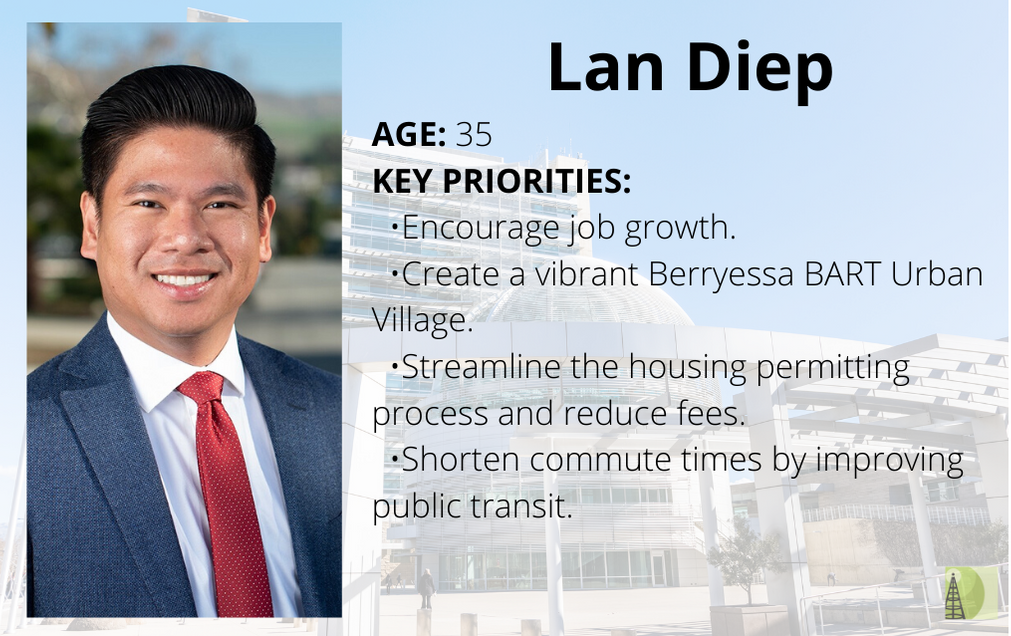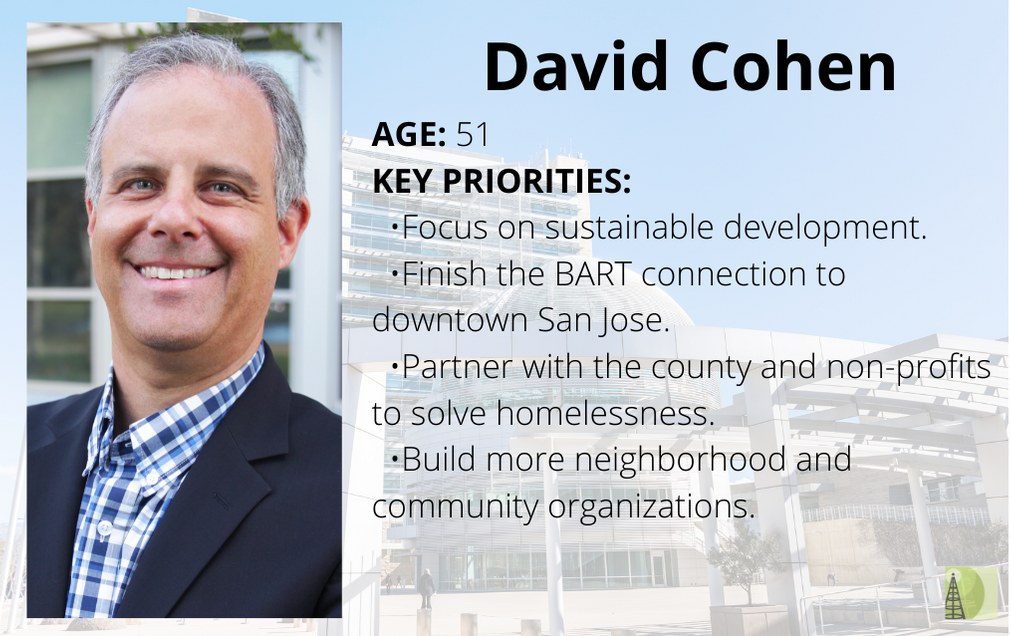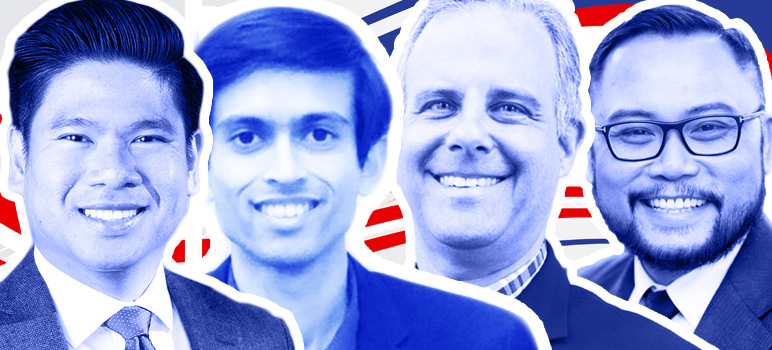San Jose Inside kicked off its election series last week with an overview of San Jose’s District 2 race—one of five seats up for grabs on the City Council in the March 3 primary. This installment looks at District 4, where Councilman Lan Diep is fending off three challengers: David Cohen, Huy Tran and Jamal Khan.
The District
District 4 covers the upper expanse of San Jose. Sandwiched between the neighboring cities of Santa Clara and Milpitas, the district spans the Berryessa and Piedmont neighborhoods and Alviso, a largely Latino community that abuts the marshy, southernmost shoreline of the San Francisco Bay.
The past few decades have seen San Jose’s North Valley evolve into an economic powerhouse, with business parks, sprawling tech campus and state-of-the-art pot dispensaries as well as recycling centers, massive warehouses, low-vacancy strip malls and the city’s most bustling flea market.
With San Jose’s first BART station expected to open in the coming year and thousands of new housing units in the pipeline, District 4 has become the most industrious, fastest-growing parts of the city—hands down.
The Incumbent
Thirty-five-year-old Lan Diep nabbed the D4 seat in 2016 by a margin of of just 12 votes and went on to position himself as one of the more conservative members of the council.
Born in Houston to Vietnamese refugees who worked odd jobs to put food on the table, according to his campaign bio, Diep moved to San Jose with his mother after his parents divorced. Diep attended Independence High School, where he says he would often arrive late because the public buses he took tended to break down.
Before venturing into the world of politics, Diep worked as a fellow for the Legal Aid Society’s Vietnamese American Workers’ Rights Project. That fellowship was preceded by an earlier stint at the Mississippi Center for Justice, where he worked on the frontlines of the 2010 BP oil spill by helping fishermen and small business file claims against the oil and gas corporation for destroying their livelihoods.

(Graphic by Grace Hase)
Over the last three years, Diep has established himself as a loyal ally of Sam Liccardo, supporting many of the business-backed mayor’s initiatives around housing production by making it easier for developers to build.
The councilman says his inclination toward public service is what makes him most qualified for the job. “That desire to serve is something that fuels me,” he says. “It’s something that brings me joy in this world that can be quite strenuous or dry at times.”
If re-elected, Diep says he wants to focus on encouraging economic growth by expanding the corporate tax base enough to fund much-needed amenities in San Jose.
With that in mind, he says he’s eager to see the Berryessa Urban Village sprout up around the new North San Jose BART extension. That 270-acre swath of land is key for the city’s future as it looks towards densifying and creating transit-oriented communities, he says, and he hopes to advance toward that goal during another four years on the council.
“We have no shortage of vision, we have no shortage of knowing what we want to do,” he tells San Jose Inside. “We want public art, we want walkable streets, we want bike lanes, we want affordable housing. And all those things that we want, it’s a wish list—but unless we fund them, we can’t do it.”
The Challengers
Diep—a Republican-turned-independent—faces three Democratic challengers for the non-partisan seat: Berryessa Union School District Trustee David Cohen, employment rights attorney Huy Tran and attorney Jamal Khan.
David Cohen, a 51-year-old father of two, has lived with his wife in the district for the past 21 years. A San Diego native, he moved with his parents to the East Coast as a young child and decided to return to California after graduating from Cornell University. He went on to earn his Ph.D in chemical engineering at UC Berkley and eventually settled in North San Jose with his wife.
In addition to a resume that boasts two decades in high-tech, Cohen has managed to dedicate a significant portion of time to public service, with 13 years as a Berryessa Union School District trustee and an earlier stint on San Jose’s Library Commission. On his campaign website, he cites protecting classroom sizes, switching to solar energy and starting dual-immersion programs in Mandarin and Spanish as some of his top accomplishments as a trustee.
Cohen says his unique mix of experience makes him well-positioned to serve the needs of D4 families and the city’s business community.

(Graphic by Grace Hase)
As North San Jose looks to add thousands of new homes in the coming years, Cohen says he wants to ensure that the city enforces its inclusionary housing requirements—especially around the new BART station. The policy requires developers to either build a certain amount of affordable units on-site or pay an in-lieu fee. “We’re not building enough resources for the neighborhoods so that people can really live in what we’ve termed in San Jose as transit villages,” he explains.
New development, he adds, should also be constructed in a sustainable way that’s carbon neutral and minimizes water usage. Another one of Cohen’s priorities is to work with non-profits to find compassionate solutions to homelessness. He also says that the city needs to start taking more of a regional approach to some of its most pressing issues.
“One of our problems—and this goes for transportation, housing and homelessness—is to make sure we’re not acting as individual entities with separate borders,” he says. “But [instead], bringing people together from across the county and across the region to find solutions to homelessness rather than having each city solving things themselves.”

(Graphic by Grace Hase)
Thirty-seven-year-old Huy Tran decided to jump into the D4 contest last year after the council voted to re-examine San Jose’s Ellis Act—a law that aims to preserve rent-controlled units when a landlord decides to redevelop the property. In the midst of a state-wide affordability crisis, he says the move made no sense to him.
Born in Southern California to Vietnamese refugees who escaped Da Nang by boat, Tran found his way to the South Bay as a young adult attending San Jose State University, where he became an active student organizer.
After college, he went to work for the California Faculty Association to fight then-Gov. Arnold Schwarzenegger’s budget cuts. He also worked for the AFL-CIO in Mississippi, advocating for hotel workers’ rights. After earning a law degree from Santa Clara University, he jumped into his current role as an employment rights attorney who frequently takes on wage theft cases.
Tran has focused much of his campaign on the need for San Jose to build more affordable housing and bolster anti-displacement protections. He says one of his top priorities is to get the council to finally enact a commercial linkage fee, which would raise money from new development to fund below-market-rate housing.
“We know there’s going to be a lot of commercial development happening and these companies they want to be good neighbors with us,” he says. “They need to contribute to the problems that they’re going to exacerbate.”
When it comes to affordable housing, Tran says he’s also interested in studying vacancy rates and how they impact the affordability crisis. Last year, while serving on San Jose’s Housing and Community Development Commission, he proposed the idea of taxing owners of vacant units. In recent months, he has also been advocating for Westwinds Mobile Home Park residents, who abruptly found out in January that they could be forced out when the land lease expires.
Tran says he also wants to find ways to shield small businesses from displacement. “We need to protect the small businesses that have built the culture of those that are in San Jose,” he explains. “It’s those mom-and-pops that make us who we are. If you look around the Berryessa area, there’s a lot of small businesses.”

(Graphic by Grace Hase)
Thirty-two-year-old Jamal Khan holds the distinction of being the only San Jose native in the D4 City Council race this year.
The near-life-long D4 resident attended UC Berkeley as a triple-major in economics, political science and rhetoric with a minor in global poverty and practice. He then proceeded to Harvard Law School while interning for the U.S. Permanent Subcommittee on Investigations and the Office of Government Ethics during summer breaks.
Khan’s resume touts a long list of public service experience, including work for the White House Office of Intergovernmental Affairs and the White House Council on Environmental Quality under the Obama. Most recently, Khan founded the American Opioid Project, which he calls a “crowdsourced encyclopedia of the opioid crisis.”
The attorney is also the only candidate in the race who didn’t scoop up endorsements from San Jose’s powerful labor or business organizations—Diep has the backing of the Silicon Valley Organization while the South Bay Labor Council gave both Tran and Cohen its blessing. But Khan views that lack of institutional support as a positive—it’s what sets him apart, he says.
“I’m not a fan of the City Council race here being almost like a pawn in a chess game between outside groups that are not even based here in the district,” Khan says. “I think that the council member who represents this district should be responsive to this district and prioritize the needs of the people who live here over any other considerations.”
And that, he says, is what he plans to do.
One way Khan plans to accomplish that is by tackling an issue that’s plagued residents near Orchard Elementary School for years: the Charcot Overpass. The controversial project would widen roads near the school, which has parents alarmed over safety and pollution concerns. “That’s something that concerns me greatly and that’s something that I’m going to take a very hard look at,” he says. “I think there should be an attempt to find some type of alternative that does not adversely impact the people who live in that area.”
D4 residents have also been grappling with car break-ins in recent years, he notes, which is why he says he’d like to enhance communication between police and the public and hire more 9-1-1 dispatchers and cops.
As for easing the city’s storied affordability crisis, Khan says he wants to explore additional ways to protect renters.
“When it comes to affordable housing, I think that the state bill that passed into law that does the rent cap was a good step,” he says. “I’m open to having the city look at making a tighter rent cap of perhaps 2 percent or 3 percent plus inflation.”
The Stakes
San Jose State political science professor Garrick Percival says the D4 race is definitely one to watch. Labor interests currently have a minority vote on the council, but stand to regain a majority by flipping the incumbent councilor’s seat.
“Diep, especially on development issues, has been a powerful voice for Liccardo’s coalition on the council,” Percival tells San Jose Inside. “I think if he loses [there are], especially on development issues, some changes in policy and changes in rhetoric on issues of housing.”
Races in District 4 have been historically close, he adds. If the trend repeats itself, that would force Diep into a November run-off.
Previous Coverage
2020 Challengers Emerge in San Jose’s D4 City Council Race
BAYMEC Unveils Endorsements for March Primary Election
SJ Council Candidates Square Off Over Fair Elections, Transportation at SVLG Forum
Third Candidate Joins Race for San Jose’s D4 Council Seat
Union Attack Ad Accuses SJ Councilman of Rewarding ‘Slavery Towers’ Developers


OMG!
BART to Berryessa still isn’t running. Must be a Government Job! So when is high speed rail coming to town 2120?
Resident of D4 here. David Cohen is a proponent of leniency towards criminals prospering under Prop 47, meanwhile property/quality of life/petty crimes have skyrocketed since Prop 47’s inception. SJPD and the DA have their hands tied behind their back while politicians like Cohen support such backwards propositions.
It’s also interesting he touts his reputation as a member of the Berryessa Union School District, where the district has steadily declined in math/reading scores while spending has gone up. https://www.publicschoolreview.com/california/berryessa-union-elementary/604800-school-district
D4 residents should be wary who they vote for. He definitely does not have my vote.
When Khamis and Davis were announcing that they were leaving the Republican party because they didn’t believe they could stay in a party that put children in cages, Diep basically said, “I’m not going to make a decision based on what I DON’T believe in, if I ever leave the Republican party it’s because I’m going to be a man of principle who believes in SOMETHING.”
Then he left quietly a year later and didn’t actually make any public statement or give any meaning or value to his decision.Why criticize someone else’s decision and act like you’d do something more visionary, and then not even make a statement to the public?
It’s a small issue to nitpick, but it stands out to me because I have a thing about people who pick their arguments AFTER they pick their positions, and this always stood out to me about Diep’s explanation for why he didn’t want to join Khamis and Davis. It was such a weird argument based on really high-horsed principles, it just seemed like an after-the-fact justification for why he wanted to be different from Khamis and Davis. Like, you REALLY believe that the President putting kids in cages and receiving the full support of his party’s congressional leadership in doing so is not a good reason to leave the Republican party? That is a disgraceful position to take.
> When Khamis and Davis were announcing that they were leaving the Republican party because they didn’t believe they could stay in a party that put children in cages, Diep basically said,
The “kids in cages” took place during the Obama regency. How did the poor, hapless Republicans get blamed for this?
That’s a desperate lie, Obama never separated children from their families at the border. That is something the Republicans 100% chose to implement, defend, and own.
The fact that you would seriously use those terms to describe the people who put actually vulnerable and helpless children in cages is not appropriate. I get that you are a very snarky commenter, but for you to make light out of the destruction of so many lives is, to me, the most offensive thing I’ve seen you say after reading highly-opinionated comments from you for years.
Fact checking the factless “Green Arrow”
https://www.politifact.com/factchecks/2019/sep/13/joe-biden/fact-checking-biden-use-cages-during-obama-adminis/
> Our fact-check showed the Associated Press photo was taken in 2014 at a Customs and Border Protection facility in Nogales, Ariz. The photo was used in an Arizona Republic article centered on an influx of children arriving at the border unaccompanied by a parent or guardian.
The Arizona Republic article, in part, said:
“They are undocumented. They entered the country illegally. And when they were apprehended by U.S. Customs and Border Protection, they were shipped to Nogales from overwhelmed processing facilities in Texas.
“But they are still children in cages, not gangsters, not delinquents. Just children, 900 of them, in a makeshift border-town processing center that is larger than a football field.”
The article adds that the children are “housed behind 18-foot-high chain-link fences topped with razor wire.”
A desperate lie?
Jamal Khan is the best choice.
David S. Wall
“The attorney is also the only candidate in the race who didn’t scoop up endorsements from San Jose’s powerful labor or business organizations.”
That IS a positive! I hope Khan wins!